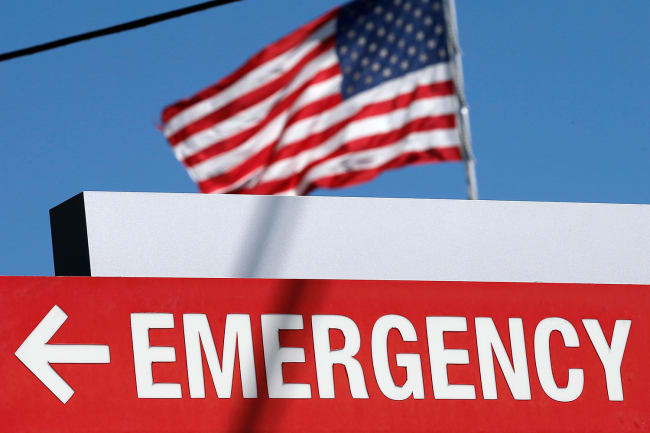In January 2014, the coverage provisions of the Patient Protection and Affordable Care Act (ACA) went into effect. Signed into law by President Barack Obama, the ACA had a crucial mission: to enhance health-care accessibility and affordability for millions of Americans. A core component of the ACA involved reforming Medicaid, the U.S. health insurance program that caters to low-income individuals and families. Specifically, the legislation aimed to expand Medicaid eligibility to include all individuals with incomes up to 138 percent of the federal poverty level (FPL), amounting to $20,120 for an individual or $41,400 for a family of four in 2023.
However, the federal government cannot require that states expand Medicaid, resulting in a coverage gap in states that chose not to broaden eligibility. Currently, that gap includes 1.9 million uninsured adults whose incomes are too high for them to be eligible for Medicaid but too low for federal marketplace subsidies. Often Americans within the gap are left without any viable health insurance, and with fatal consequences. Between 2014 and 2017, an additional 15,600 preventable deaths attributable to difficulty in accessing adequate medical care were reported among adults ages fifty-five to sixty-four in non-expansion states. In contrast, the same period saw 19,200 lives in the same age category saved thanks to increased access in Medicaid expansion states.
Medicaid expansion has emerged as a divisive partisan issue
The Partisan Nature of Medicaid Expansion
Medicaid expansion has emerged as a divisive partisan issue. Although proponents of expansion view it as a crucial step toward reducing health-care disparities and ensuring access for vulnerable populations, opponents argue for a more limited government role. States governed by Republicans are far more likely to reject expansion, and ten states have opted against expanded Medicaid coverage: Alabama, Florida, Georgia, Kansas, Mississippi, South Carolina, Tennessee, Texas, Wisconsin, and Wyoming.
Among these, Texas stands out as having the worst insurance coverage in the country. With 18 percent of its population uninsured, the state uninsurance rate is more than double the national average, which is just over 8 percent. The situation is compounded by the state's restrictive Medicaid eligibility limits. In Texas, adults without children are not eligible for Medicaid coverage regardless of their income, and parents are eligible only if they earn less than 13 percent of the FPL (an annual income of less than $3,900 for a family of four). Medicaid income eligibility is set on a state-by-state basis, and the restrictive limit in Texas contributes to a ballooning of uninsurance among adults; as many as 772,000 coverage gap adults live in the Lone Star State alone.
Texas's Medicaid Gap
Medicaid eligibility limits in Texas vs. in expansion states
Why Not Expand Medicaid?
Conservative opposition to Medicaid is the most likely reason for non-expansion, especially given the political climate in Texas. Yet this opposition is not insurmountable; several majority-Republican states became late adopters of Medicaid expansion as a result of citizen-initiated ballot measures. Idaho, Missouri, Nebraska, Oklahoma, Utah, and most recently South Dakota all expanded Medicaid eligibility this way, highlighting the potential for voters to pass Medicaid expansion in Florida and Wyoming, the remaining non-expansion states with ballot initiative processes. However, the other non-expansion states, including Texas, do not allow citizen initiatives, effectively preventing voters in these states from taking matters into their own hands.
Since 2019, only two states have managed to adopt Medicaid expansion through legislative or executive processes: North Carolina and Virginia. Although both states have Republican majorities in their House and Senate, North Carolina's Democratic governor, Roy Cooper, and Virginia's Democratic former governor, Ralph Northam, each signed Medicaid expansion into law. In stark contrast, Texas has maintained non-expansion despite fiscal incentives offered by the federal government as part of the American Rescue Plan Act of 2021. Texas Governor Greg Abbott and Lieutenant Governor Dan Patrick remain staunch opponents of Medicaid expansion. Abbott has described expansion as "a tax increase waiting to happen," and Patrick has used his position to prevent bills for Medicaid expansion from reaching the floor of the state legislature. Given this political landscape, the prospect of the state government opting for Medicaid expansion to address its coverage gap appears highly unlikely.
By extending coverage to a substantial number of Texans, Medicaid expansion holds the potential to transform the state's health-care landscape
The legislators' anti-expansion attitudes are not shared by the majority of Texans, who generally support expanding Medicaid coverage in the state. A 2023 survey administered by the University of Texas at Austin found that 73 percent of Texas voters support Medicaid expansion, including 63 percent of voters who identify as "strong Republicans." Despite widespread support for expansion, the state government has not budged. This not only makes Texans unable to reap the benefits of increased Medicaid coverage, but also means that they are still supporting Medicaid programs in other states. Between 2014 and 2024, Texas residents will have paid $36.2 billion in federal taxes that will be used toward Medicaid funding in states that have expanded coverage.
What Outcomes Could Expansion Lead To?
Expanding Medicaid in Texas could improve Texans' access to health care, estimates showing that as many as 1,435,000 currently uninsured individuals could become eligible for coverage. This includes the 772,000 adults in the coverage gap and an additional 663,000 who could be eligible for marketplace subsidies but remain without insurance. Although increased access does not necessarily translate to better health outcomes, studies have found a plethora of health benefits associated with Medicaid expansion. These outcomes include lower maternal and infant mortality, earlier cancer detection, increased engagement in HIV prevention and treatment, increased likelihood of children's preventive care visits, a reduced tobacco-related public health burden, and more. Furthermore, considering that 74 percent of individuals in the Texas coverage gap are people of color, Medicaid expansion could also play a significant role in addressing existing racial disparities in health-care access and outcomes. By extending coverage to a substantial number of Texans, Medicaid expansion holds the potential to transform the state's health-care landscape.
What's Being Done?
Currently, Texas is home to an array of advocacy groups aiming to engage policymakers and foster support for Medicaid expansion. One prominent organization is Cover Texas Now, a coalition of consumer and faith-based groups advocating for health-care reform. In 2021, more than 188 grassroots, community-based, and medical organizations united with Cover Texas Now to urge state officials to expand Medicaid. The voices in support of Medicaid expansion have also resonated in opinion pieces published in major news sources, including the Dallas Morning News and Texas Monthly, showcasing the backing for this crucial cause.
Even with growing advocacy efforts, progress on the matter has been limited. Texas legislators continue to block Medicaid expansion bills from being heard, and without citizen initiatives the road ahead remains arduous. Despite the challenges, Medicaid expansion should remain a focal point in ongoing efforts to ensure more equitable and inclusive health care for all Texans. This battle for Medicaid expansion is an internal one, between citizens and legislature, with tremendous consequences for the health of all who call the Lone Star state home.













